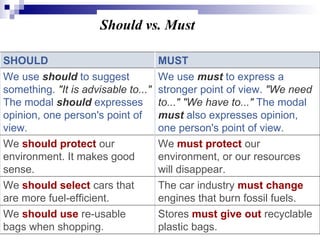Should must have to
•Download as PPT, PDF•
9 likes•20,903 views
The document discusses the differences between the modal verbs "must" and "should" as well as "must" and "have to". "Must" expresses strong obligation or necessity from the speaker's point of view, while "should" suggests something advisable. "Must" cannot be used for past obligations, where "had to" is used instead. "Have to" expresses objective obligation from an external source rather than personal views.
Report
Share
Report
Share

Recommended
Recommended
More Related Content
What's hot
What's hot (20)
Modal verbs-must/have to- should/ought to-may/might/must/can have p.p. verb 

Modal verbs-must/have to- should/ought to-may/might/must/can have p.p. verb
Similar to Should must have to
Similar to Should must have to (20)
More from dursitarosales
More from dursitarosales (20)
Recently uploaded
APM Welcome
Tuesday 30 April 2024
APM North West Network Conference, Synergies Across Sectors
Presented by:
Professor Adam Boddison OBE, Chief Executive Officer, APM
Conference overview:
https://www.apm.org.uk/community/apm-north-west-branch-conference/
Content description:
APM welcome from CEO
The main conference objective was to promote the Project Management profession with interaction between project practitioners, APM Corporate members, current project management students, academia and all who have an interest in projects.APM Welcome, APM North West Network Conference, Synergies Across Sectors

APM Welcome, APM North West Network Conference, Synergies Across SectorsAssociation for Project Management
Recently uploaded (20)
ICT Role in 21st Century Education & its Challenges.pptx

ICT Role in 21st Century Education & its Challenges.pptx
Ecological Succession. ( ECOSYSTEM, B. Pharmacy, 1st Year, Sem-II, Environmen...

Ecological Succession. ( ECOSYSTEM, B. Pharmacy, 1st Year, Sem-II, Environmen...
APM Welcome, APM North West Network Conference, Synergies Across Sectors

APM Welcome, APM North West Network Conference, Synergies Across Sectors
Web & Social Media Analytics Previous Year Question Paper.pdf

Web & Social Media Analytics Previous Year Question Paper.pdf
Measures of Central Tendency: Mean, Median and Mode

Measures of Central Tendency: Mean, Median and Mode
Measures of Dispersion and Variability: Range, QD, AD and SD

Measures of Dispersion and Variability: Range, QD, AD and SD
Should must have to
- 1. Should vs. Must Stores must give out recyclable plastic bags. We should use re-usable bags when shopping. The car industry must change engines that burn fossil fuels. We should select cars that are more fuel-efficient. We must protect our environment, or our resources will disappear. We should protect our environment. It makes good sense. We use must to express a stronger point of view. "We need to..." "We have to..." The modal must also expresses opinion, one person's point of view. We use should to suggest something. "It is advisable to..." The modal should expresses opinion, one person's point of view. MUST SHOULD
- 2. Must (subjective obligation) We often use must to say that something is essential or necessary (strong advice), for example: I must go. You must stay here Structure of Must Must is a modal auxiliary verb. It is followed by a main verb. The structure is: subject + must + main verb The main verb is the base verb (infinitive without "to"). Look at these examples:
- 4. In general, must expresses personal obligation. Must expresses what the speaker thinks is necessary. Must is subjective . Look at these examples : I must stop smoking. You must visit us soon. He must work harder . In each of the above cases, the "obligation" is the opinion or idea of the person speaking. In fact, it is not a real obligation. It is not imposed from outside .
- 10. We can use have to in all tenses , and also with modal auxiliaries. We conjugate it just like any other main verb. Here are some examples: it again. to do have may They modal (may) the time. to change had have We present perfect to wait. having is She present continuous tomorrow. to work have will I future simple today. to work have I present simple yesterday. to work had I past simple infinitive main verb have auxiliary verb subject
- 12. Angela, you ______leave your clothes all over the floor like this. 10 Bicyclists ______remember to signal when they turn. 9 Do you ________work next weekend? 8 You _______come if you don’t want to. 7 Your daughter may _____ try on a few different sizes. 6 If you are under 13 you ____ get your parents' permission. 5 We ______forget to take the chicken out of the freezer. 4 All employees ________be on time for work. 3 She will _____wait in line like everyone else. 2 Yesterday I_______ finish my Geography project.
